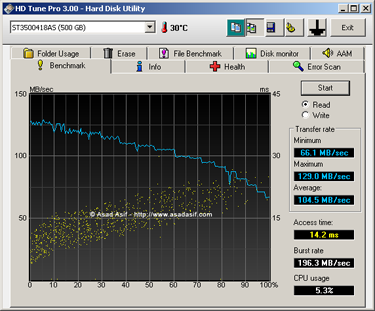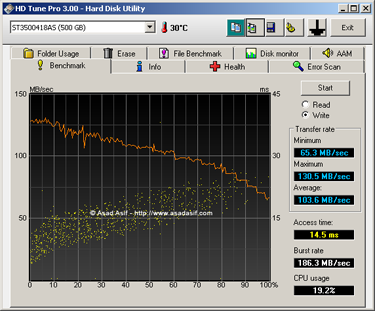Weblog
04/03: Seagate 7200.12 ST3500418AS HDD (500GB) benchmark
I got this disk today and was doing some benchmarks. I thought I should put these here for general information on the drive's performance.It is a Seagate 7200.12 ST3500418AS drive with 16MB cache (compared to 32MB on 500GB 7200.11 model) on nVidia nForce 4 SATA controller. Previously, the ST3500418AS drives were detected as ST3500410AS but this one is detected as ST3500418AS, just like the sticker on the top says. That's a relief! Internet forums are filled with talk about ST3500418AS being detected as ST3500410AS.
There has been a lot of talk about firmware issues with the 7200.11 series of Seagate's drives. The issue resulted in the drive suddenly dying without any reason. The 7200.12 series hasn't had any similar firmware issues reported as yet. For all intents and purpose, these drives are impervious to he firmware issues plaguing the 7200.11 series hard disk drives.
Anyway, enough talk... The read and write benchmarks by HD Tune Pro are given below. Click on the thumbnails to see the full image for either benchmark.
This disk has an average transfer rate of above 100MB/s for both reading and writing! I reckon two or more of these disks in RAID configuration (mirroring) will work beautifully.
Read More!
22/10: Linux Compromised With 'root' Password Recovery?
I have been dabbling into Texas Instruments' Da Vinci DM6467 Digital Video Processing kits recently and consider myself a relative Linux n0ob, relative being the key word. :)I used Red Hat 9 as the host workstation for booting the kits over NFS (Network File System). I had come back to working on it after a couple days and had forgotten 'root's' password I had set when I installed Red Hat 9 on the host system.
I looked around on the internet and found a solution to reset the password for user 'root'.
Read More!
23/05: Microsoft Windows XP Error: 0x0000009C a.k.a 0x9C
I have been facing Microsoft Windows XP error 0x0000009C (Machine_Check_Exception) frequently since the last couple months accompanied by the dreaded BSOD (Blue Screen Of Death) associated with pre-Vista Windows based systems based on the NT kernel like Windows 2000, Windows XP, etc. From what I have read, Windows Vista presents a Red Screen Of Death (RSOD).Any way, the thing I noticed most frequently associated with this error code is that just before it occurred, one of the hard disk drives in my computer system made a clicking sound which usually signifies hard disk failure. This lead me to check the hard disk drives extensively via disk check utility in Windows (chkdsk [drive]: /r) and some times, the utility reported bad sectors. Clearly, something fishy was going on.
I consulted Microsoft's KB articles and the help site resources for this error without any fruitful results. I searched on various forums and the suggestions to solve this error revolved around removing ZoneAlarm firewall software when clearly, this was a hardware error.
The plethora of random suggestions were very confusing and seemed more an attempt to guess at the solution rather than making an informed choice.
Read More!
20/06: The OLPC Project - call for localization
I recently attended Microsoft's Pakistan Developer Conference which attracted IT experts from all over Pakistan alongside various other government officials.
There, I met Dr. Habib Khan, who is working for the OLPC [One Laptop Per Child] project in Pakistan. We had a brief conversation about the project when he was leaving and he requested that all those who can help should come forth for localizing OLPC for Pakistan. This will ultimately benefit the poor people in Pakistan who don't know English language and for whom the currently English-based OLPC project is useless since they have no familiarity with the English language. He sent me a couple of links for those who are interested:
OLPC News
OLPC current events
For those software developers; Pakistan-based or otherwise, who are interested in localizing OLPC project to Urdu and other local languages, please post what you can contribute in this thread on Linux Pakistan site. Once there are a few people interested, I will direct Dr. Habib to the thread/site so interested people can interact with him and he can then further guide them.
I request all those interested in this to step forward for the betterment of the cause of OSS and the very people of Pakistan who will use this OLPC project for gaining knowledge and ultimately improving their lives.
For those who can do it, please forward this information to other communities and forums too where people might be interested to help.
10/06: P2P networks; a blessing or menace?
File sharing is a rather old concept. It has evolved over time to the current P2P and torrent networks. Napster and Kazaa were very popular file sharing services at the turn of this century. Millions of internet users use file sharing predominantly for downloading pirated software, movies and music amongst many other things. This illegal sharing dominates the volume of legal sharing like that of open source software including Linux based distributions. By some estimates, 35% of internet traffic today is caused by BitTorrent alone!The world’s population is around 6.5 billion out of which 1.115 billion have access to the internet. 35% of 1.115 billion is 390.25 million people. The total internet users indulging in file sharing constitute a larger number of users than 390.25 million since BitTorrent is just one of the ways for file sharing. If you are providing web hosting services or running a popular website, imagine a healthy percentage of more than 400 to 600 million (a rather conservative estimate) hits in a short period of time. Welcome to the world of DDOS (Distributed Denial Of Service) attacks!
Read More!


